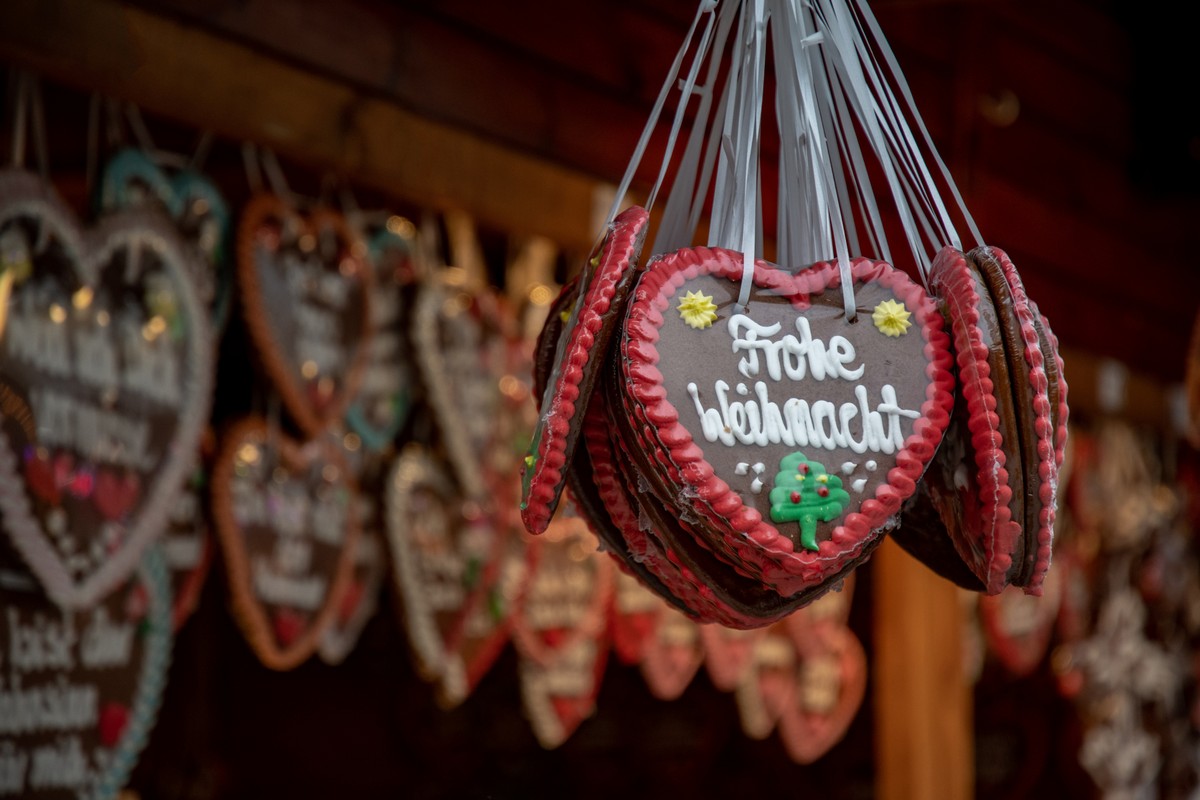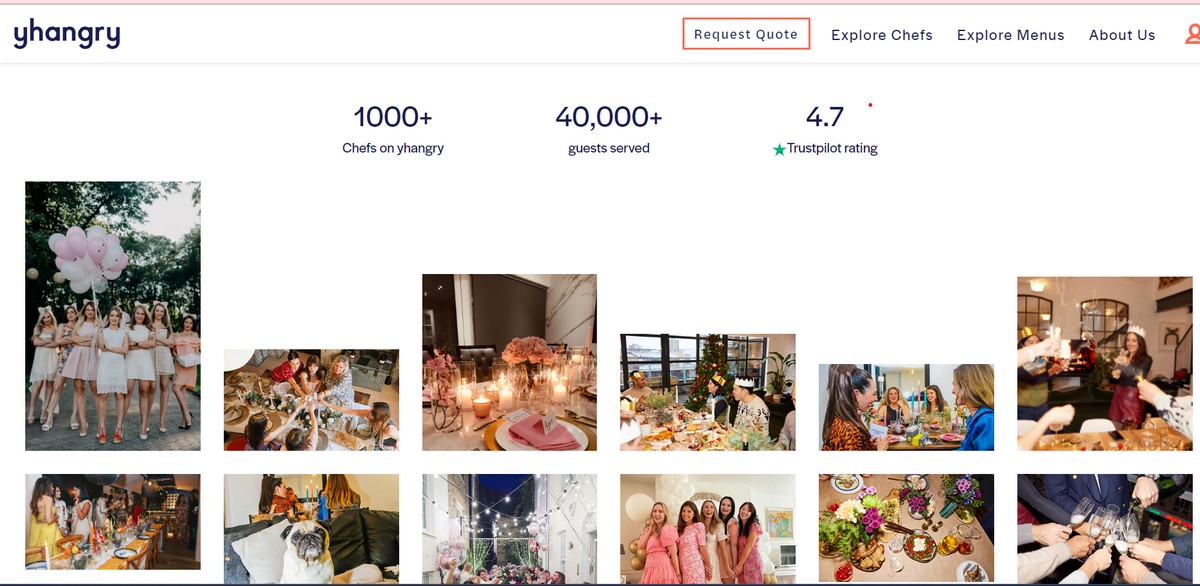
As the snow gently falls and the festive lights twinkle, families across Germany gather around beautifully adorned tables to celebrate Christmas Eve. The dishes served are not just delicious; they carry the essence of generations, telling stories of heritage, regional diversity, and familial bonds.
But what makes the traditional German Christmas Eve dinner so unique? What are the dishes that grace the tables from Berlin to Bavaria? How have these culinary traditions evolved, and what do they symbolise? This guide aims to be your go-to guide for creating an authentic German Christmas Eve feast that is as rich in flavour as it is in tradition.

Experience German Christmas Eve With yhangry
Why settle for the ordinary when you can elevate your Christmas Eve with an extraordinary German feast, meticulously crafted just for you? Choose yhangry, the UK’s premier private chef service, and experience the epitome of culinary expertise this festive season.
Simply, yhangry is your ultimate choice for a German Christmas Eve for a number of reasons:
- Bespoke Menus: Why follow the crowd? With yhangry, you can curate your own German-inspired menu to perfectly align with your tastes and dietary requirements.
- Masterful Chefs: Our chefs are not just experienced; they’re virtuosos in the realm of German cuisine. Ready to turn your dinner table into a Michelin-star experience?
- Effortless Booking: Forget the fuss. A memorable culinary experience is just a click away, thanks to our user-friendly online booking platform.
- Unmatched Flexibility: Whether it’s a cosy family dinner or a grand yuletide bash, we’ve got you covered. Our scale adapts to your needs, not the other way around.

Discover the finest private chefs in the UK and let yhangry imbue your Christmas celebration with an authentic German flair. Don’t just celebrate, make it an occasion to remember.

Historical Context of German Christmas Eve
Christmas Eve, or Heiligabend, is more than a festive occasion in Germany; it’s a deeply rooted tradition that dates back centuries. The celebration has evolved, reflecting changes in religious practices, societal norms, and cultural influences.
Traditionally, the Advent season leading up to Christmas was a time of fasting and spiritual contemplation for many Christians. During this period, people would often abstain from eating meat, dairy, and other indulgent foods. Although Christmas Eve signalled the conclusion of this fasting phase, the custom of having a humble and modest meal continued to be observed. Hence, the Christmas Eve meal was often meatless in many regions, featuring fish, soups, and vegetables. Over time, this tradition gave way to more elaborate dishes, yet the essence of simplicity and humility remained.

Traditional Christmas Eve Meals
Christmas Eve in Germany is a culinary journey that reflects the nation’s diverse heritage and regional flavours. From the simplicity of potato salad to the elegance of roasted carp, the traditional meals served on Heiligabend are a delightful blend of taste and tradition.
Potato Salad and Sausages
A staple in many German households, potato salad often takes centre stage on Christmas Eve, representing home, family, and the joy of togetherness. Paired with sausages like bratwurst or frankfurter, this humble dish embodies comfort and warmth. Variations abound, with some regions adding pickles, apples, or mustard. It’s a dish that resonates with nostalgia, often prepared according to family recipes passed down through generations.
Fish Dishes
Fish holds a special place in the German Christmas Eve menu, symbolising water, renewal, and life. Carp is a classic choice, often baked or fried and served with boiled potatoes and steamed vegetables. Other popular fish dishes include salmon, hake, or trout, prepared in various styles to suit regional preferences.
Soups
Soups are a comforting and versatile option for Christmas Eve dinner. From hearty gulasch soup to delicate lentil soup, the variety reflects the richness of German culinary traditions. Served with crusty bread or soft pretzels, soups provide a warm and satisfying start to the festive meal.
Desserts
No German Christmas Eve dinner is complete without a touch of sweetness. Stollen, a dry cake filled with marzipan and raisins, is a festive favourite. Numerous households also engage in the tradition of baking lebkuchen biscuits, infused with honey and anise, to capture the quintessential aromas and tastes of the festive season. Other desserts may include baked apples, marzipan treats, or a rich chocolate pudding.


Christmas Eve in Different Regions of Germany
Germany’s diverse landscape, from the coastal North to the mountainous South, has given rise to a rich array of Christmas Eve traditions. Each region adds a unique flavour to the celebration, reflecting local customs, ingredients, and culinary techniques.
Northern Germany
In the coastal regions of Northern Germany, seafood plays a prominent role in Christmas Eve dinner. Dishes like pickled herring, shrimp, and baked fish are common, reflecting the area’s maritime heritage.
Southern Germany
The mountainous regions of Southern Germany are known for their hearty and robust cuisine. Christmas Eve may feature roast venison, spaetzle (German dumplings), and rich stews. The influence of neighbouring countries like Austria and Switzerland is evident in the use of cheese in fondue and raclette.
Eastern Germany
In Eastern Germany, carp is a traditional Christmas Eve dish, often fried or baked. Preparing the carp is a ritual in itself, with some families keeping the live fish in the bathtub before cooking. This tradition symbolises prosperity and renewal and is deeply rooted in the region’s history.
Western Germany
Western Germany, with its proximity to France and Belgium, showcases a fusion of flavours in its Christmas Eve menu. Dishes like beef rouladen, braised red cabbage, and potato pancakes blend German tradition and French elegance. The use of wine and fine pastries adds a touch of sophistication to the meal.

Modern Interpretations and Fusion
Tradition and innovation walk hand in hand in German Christmas Eve dinners. While the classic dishes continue to be cherished, contemporary twists and global influences add new dimensions to the festive feast.
Influence of Global Cuisine
Germany’s cosmopolitan cities and multicultural communities bring global flavours to the Christmas Eve table. Fusion dishes that blend German traditions with Asian, Mediterranean, or Latin American influences are becoming popular. Whether it’s sushi with a German twist or rouladen with international fillings, the fusion of cultures enriches the culinary landscape.
Vegetarian and Vegan Options
With the growing trend towards plant-based diets, vegetarian and vegan options are finding their place on the German Christmas Eve menu. Meatless versions of classic dishes, innovative salads, and plant-based desserts cater to diverse dietary preferences. This inclusivity ensures everyone can partake in the festive feast, regardless of nutritional choices.

A Complete German Christmas Eve Dinner Menu
Creating a traditional German Christmas Eve dinner is a delightful culinary adventure. Whether you’re planning to host a festive gathering or simply want to explore the flavours of Germany, here’s a complete menu that captures the essence of this cherished tradition.
Appetisers
- Pickled Herring Salad: A refreshing start with flavours of the sea.
- German Pretzel Bites: Served with mustard or cheese dip.
- Creamy Mushroom Soup: A warm and comforting beginning.
Main Courses
- Roast Goose With Apple Stuffing: A centrepiece dish that’s rich and flavorful.
- Baked Carp With Lemon-Herb Butter: A traditional favourite with a modern twist.
- Vegetarian Rouladen: Stuffed with vegetables and grains for a meatless option.
Side Dishes
- Potato Salad With Bacon and Chives: A classic with a gourmet touch.
- Braised Red Cabbage With Apples: Sweet and tangy, a perfect accompaniment.
- Spaetzle (German Dumplings): Soft and buttery, it pairs well with meat dishes.
Desserts
- Christmas Stollen: Filled with marzipan and dusted with powdered sugar.
- Lebkuchen Cookies: Spiced with cinnamon and cloves, a festive treat.
- Baked Apples with Honey and Nuts: A simple yet elegant dessert.
Drinks
- Gluhwein (Mulled Wine): Spiced with cinnamon and cloves, perfect for toasting.
- German Beers: A selection of local brews to complement the meal.
- Hot Chocolate With Peppermint: A non-alcoholic option for all to enjoy.

Final Thoughts
The traditional German Christmas Eve dinner is a celebration that transcends the boundaries of a meal. It’s a feast of tradition, a symphony of flavours, and a reflection of a culture that values heritage, family, and community.
Private chefs on yhangry can craft the perfect traditional German Christmas Eve meal for you. From the classic roast goose to the delicate stollen, they bring the authentic flavours of Germany to your table, tailored to your preferences. Explore our private chef options for Christmas, and let us add a touch of magic to your celebration.
Whether you’re of German descent or simply intrigued by the rich tapestry of global culinary traditions, we hope this guide has inspired you to embrace the feast of tradition. May your Christmas Eve be filled with the flavours of Germany, the laughter of loved ones, and the magic of a tradition that continues to enchant and inspire.
Frohe Weihnachten! (Merry Christmas!)
- What food do Germans eat on Christmas Eve?
-
Germans typically eat potato salad with sausages, carp, roast goose, and desserts like stollen on Christmas Eve.
- What is the Christmas Eve tradition in Germany?
-
The Christmas Eve tradition in Germany often involves a family meal, church services, decorating the Christmas tree, and exchanging gifts.
- What do you eat for Christmas dinner on Eve?
-
Traditional dishes like potato salad, carp, roast meats, and desserts like stollen are commonly served for Christmas Eve dinner in Germany.